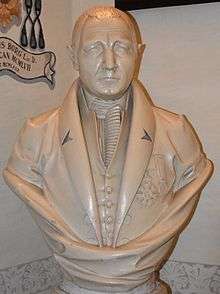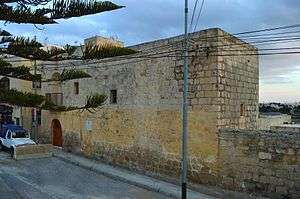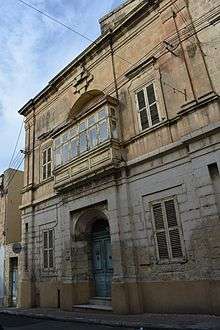Vincenzo Borg
Vincenzo Maria Borg (Maltese: Ċensu Maria Borg, 11 January 1777 – 18 July 1837), also known by his nickname Brared (or Braret), was a Maltese merchant who was one of the main insurgent leaders during the French blockade of 1798–1800. He was a lieutenant from 1801 until he was deposed in January 1804.
Vincenzo Borg | |
|---|---|
 Bust of Vincenzo Borg, "Brared", at the St Helen's Basilica Museum with the Maltese Blockade Gold Medal.[1][2] | |
| Born | 11 January 1777 |
| Died | 18 July 1837 (aged 60) |
| Burial place | Collegiate Parish Church of Birkirkara |
| Nationality | Maltese |
| Other names | Brared |
| Occupation | Merchant and lieutenant |
| Military career | |
| Allegiance | |
| Service/ | National Congress Battalions |
| Battles/wars | Siege of Malta (1798–1800) |
| Awards | Pro Patria gold medal (1801) Companion of the Order of St Michael and St George (1833) |
Life
Ċensu Borg, nicknamed Brared,[6][7] was born on 11 January 1777 in the town of Birkirkara. He was one of the leading cotton merchants in Malta, and was a popular figure on the island.[8] As part of his business, he used to sell products called brared (singular: barrada) and thus originated his nickname.[7]
When the Maltese rebelled against the French occupation in 1798, Brared was chosen by the inhabitants of Birkirkara and Mosta as their leader. He was in charge of the largest battalion among the insurgent army,[8] and became one of the main leaders in the uprising, along with Emmanuele Vitale and Francesco Saverio Caruana.[9] He has financed a number of soldiers throughout the blockade.[7]

Throughout the blockade, capomastri under Brared's command built a number of batteries to bombard French positions and prevent a counterattack, including Għargħar Battery, Ta' Għemmuna Battery and several batteries at Sliema. Brared had his field headquarters at Ta' Xindi Farmhouse, today one of the few surviving landmarks of the blockade.[10]
On 4 February 1799, Brared suggested to Captain Alexander Ball that Malta be placed under British protection, and he hoisted the first British flag on the island.[3][9] On 2 February 1801, Brared was awarded the gold Pro Patria medal in recognition of his role in the blockade.[9] He became the lieutenant of Birkirkara and Mosta from 1801 to 1804.[7] He quarreled with Ball in January 1804 due to alleged political intrigues,[9] and was placed under house arrest. He was made a knight of the Order of St Michael and St George on 9 February 1833.[7][8]
Brared died on 18 July 1837, and was buried in the parish church of his hometown Birkirkara.[7][8]
Further reading
- Information about the house of Brared next to St Helen Church. Zammit, Andrea (2009). Our Architects: A Private Archive Unveiled. Book Distributors Limited. ISBN 978-99909-050-8-3. Archived from the original on 17 December 2016.
- "Character of Vincenzo Borg". The Appeals of the Nobility and People of Malta: To the Justice, Public Faith, and Policy of the British Government, for the Fulfillment of the Conditions Upon which They Gave Up Their Island to the King, Namely Their Ancient Rights Under a Free Constitution. Lloyd. 1811. pp. 1–15.
References
- Sammut, Joseph C. (1992). "Maltese Blockade Medals". Proceedings of History Week: 77–87.
- "Zammit, Winston (2005). Forom ta gvern lokali f'Birkirkara - It-tieni parti: zmien il-Francizi u l-imblokk (1798-1800). Festa [Sant'Elena, Birkirkara], 2005, pp. 121-125" (PDF).
- "200-year-old History in an old musty archive". The Malta Independent. 11 March 2012. Archived from the original on 4 March 2016.
- Jaccarini, C. J. (2002). "Il-Muxrabija: Wirt l-Izlam fil-Gzejjer Maltin" (PDF). L-Imnara (in Maltese). Ghaqda Maltija tal-Folklor. 7 (1): 17–22.
- "Mallia, G. (2002). Birkirkara fi zmien il gwerra. Festa [Sant'Elena, Birkirkara], 2002, pp. 127-129" (PDF). Cite journal requires
|journal=(help) - Cassar Pullicino, J. (1956). "Social Aspects of Maltese Nicknames" (PDF). Scientia. 22 (2): 69.
- Morana, Martin (2012). Ara x'int tgħid: glossarju enċiklopediku ta' termini storiċi, toponimi, qwiel u idjomi, tradizzjonijiet Maltin, kurżitajiet oħra (in Maltese). Martin Morana. p. 40. ISBN 9789995703608. OCLC 830362895.
- Schiavone, Michael J. (2009). Dictionary of Maltese Biographies Vol. 1 A-F. Pietà: Pubblikazzjonijiet Indipendenza. p. 289. ISBN 9789993291329.
- Sammut, Joseph C. (1992). "Maltese Blockade Medals" (PDF). Proceedings of History Week: 76–87. Archived from the original (PDF) on 17 April 2016.
- Spiteri, Stephen C. (May 2008). "Maltese 'siege' batteries of the blockade 1798–1800" (PDF). Arx – Online Journal of Military Architecture and Fortification (6): 4–47. Archived from the original (PDF) on 1 May 2016. Retrieved 1 May 2016.
